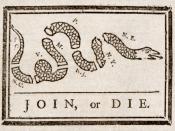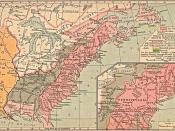After the French and Indian War, the British imposed several acts on the colonies to help the British get out of their war debt. Though colonists had opposed previous taxation policies decreed by Parliament, the colonists opposing those acts were small in number. As Great Britain imposed more policies and became stricter in enforcing the policies, tension between Great Britain and the colonies grew until protests and violence erupted from the colonists. Colonists refused to pay taxes, organized protests and rebellions, and smuggled goods. Although there are many economic factors that contributed to the American Revolution, the Stamp, Townshend, and Tea Acts were the main cause of the American Revolution.
After the Stamp Act was passed, Patrick Henry declared it "taxation without representation" in the Virginia Resolves. Henry argued that in England the right to tax people laid in the hands of the House of Commons, but since the colonists had no representatives in the House, the House had no right to tax the colonies.
The Parliament referred to colonists not having any representatives in the House of Commons as virtual representation, whereas the colonies wanted direct representation. The Virginia Resolves brought together representatives from nine colonies for the Stamp Act Congress. The Stamp Act Congress is important because the colonies were finally starting to unite together. Had the colonies not united, they would have lost the American Revolution miserably or the Revolution might not have occurred at all. The Stamp Act Congress issued a Declaration of Rights and grievances that stated that Parliament lacked the power to impose taxes on the colonies because the colonists were not represented in Parliament. The Sons of Liberty, a secret resistance group organized by Boston shopkeepers, artisans, and laborers, protested the Stamp Act by harassing customs workers, stamp agents, and royal governors.


